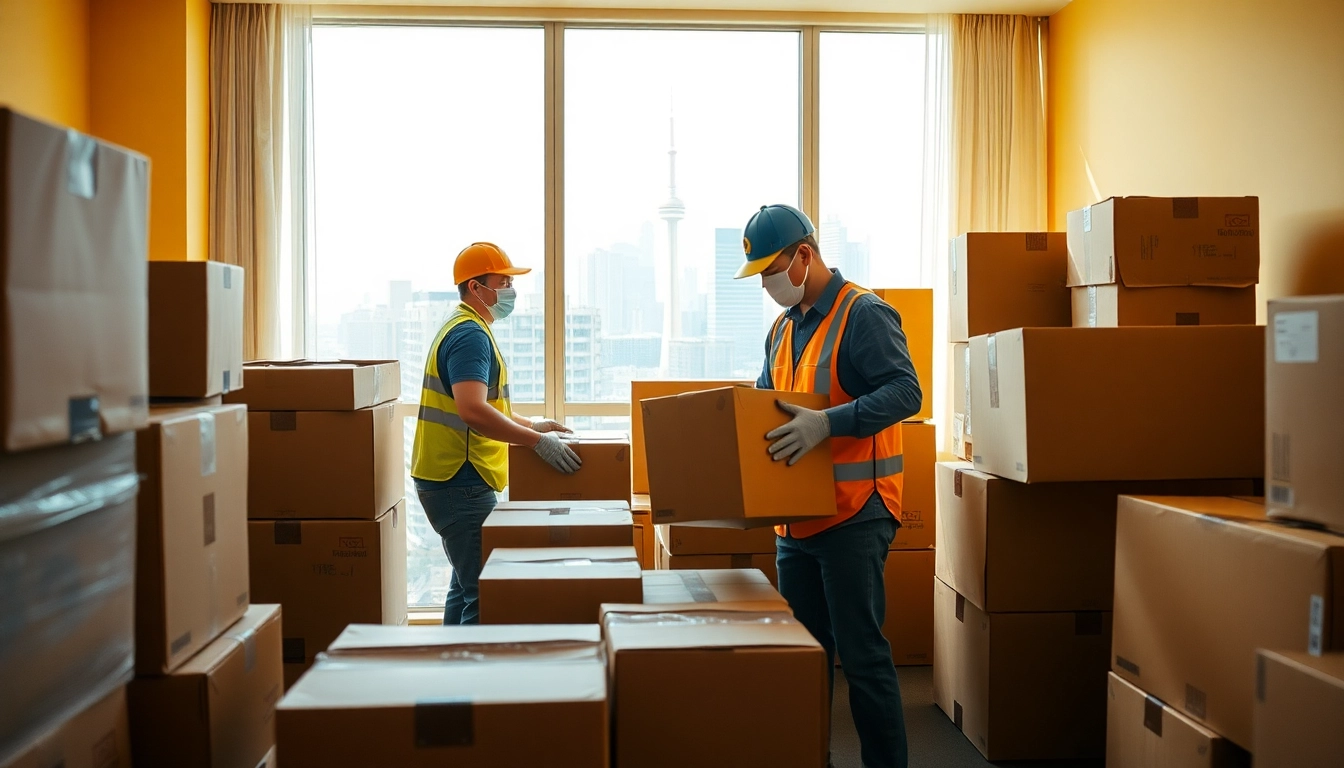Understanding Moving Services in Toronto
Moving is a significant event in anyone’s life, often filled with excitement and anxiety alike. Whether you’re relocating to a new home, transitioning your business to a new location, or even downsizing, having the right moving services in Toronto can make all the difference. In this article, we delve into the various aspects of moving services, helping you understand what to expect and how to prepare for a smooth transition.
What are Moving Services?
Moving services encompass a variety of tasks related to relocating personal belongings from one location to another. These services are not just limited to transportation; they can include packing, unpacking, loading, unloading, and even storage solutions. A comprehensive moving service will often customize their offerings based on the specific needs of the customer.
Typically, moving services can be categorized into residential and commercial services. Residential services are designed for individuals moving homes, while commercial services cater to businesses needing to relocate their offices or commercial goods.
Types of Moving Services Available
In Toronto, various types of moving services can be tailored to meet diverse customer needs. Here are some of the most popular options:
- Local Moving: Ideal for short distances, usually within the same city. Local moving services can be arranged on short notice and are generally charged by the hour.
- Long-Distance Moving: This type of service is designed for moves that cover greater distances, whether across provinces or even internationally. Long-distance moving involves logistics and planning to ensure the safe delivery of belongings over vast distances.
- Commercial Moving: Businesses can enlist specialized moving services that handle office furniture, equipment, and sensitive documents. These moves often require careful planning to minimize downtime and ensure a smooth transition.
- Packing and Unpacking Services: Many companies offer packing services where professional movers come in and pack your belongings for you. Unpacking services help you settle in faster once you arrive at your destination.
- Storage Services: If you need additional time for setting up your new home or office, many moving companies offer storage solutions. These facilities are typically climate-controlled and secure, providing peace of mind for your belongings.
Benefits of Hiring Professionals for Moving
Opting for professional moving services comes with several advantages:
- Expertise and Efficiency: Professional movers are trained to handle heavy and fragile items safely and efficiently, minimizing the risk of damage.
- Time-Saving: With a designated team handling the logistics, you can focus on other crucial aspects of moving—such as transitioning your utility services or saying goodbye to friends.
- Insurance Options: Most reputable moving services offer insurance coverage, protecting your belongings in case of unforeseen circumstances.
- Stress Reduction: Moving can be overwhelming, and having professionals on your side can alleviate much of the stress associated with the process.
Choosing the Right Moving Company
With numerous options available, how do you choose the right moving company for your relocation? Here are key factors to guide you through the decision-making process.
Factors to Consider When Selecting Movers
Several factors can influence your choice of a moving service:
- Reputation: Research the company’s reputation through online reviews, referrals from friends or family, and their overall online presence.
- Experience: Consider how long the company has been in the industry. Experienced movers will likely have dealt with a variety of moving scenarios.
- Services Offered: Ensure the company provides the specific services you need, whether it’s local moves, commercial moves, or storage solutions.
- Transparent Pricing: A good moving company will provide clear and comprehensive quotes that outline all costs involved in the moving process.
- Licenses and Insurance: Verify the company is licensed and insured to operate in Toronto, which helps ensure your moving process is handled legally and safely.
Reading Reviews and Testimonials
One of the best ways to gauge the reliability of a moving company is through reviews and testimonials. Websites such as Yelp, Google Reviews, and social media platforms can provide insights into customer experiences. Pay attention to:
- How the company responds to negative reviews.
- The consistency of positive feedback across multiple platforms.
- Specific mentions of services that stood out, whether positively or negatively.
Look for testimonials that discuss aspects important to you, such as punctuality, care for belongings, and overall professionalism.
Comparing Moving Quotes
Once you’ve shortlisted a few moving companies, it’s time to get quotes. Here’s how to effectively compare them:
- Details Matter: Make sure each quote includes the same services to ensure a fair comparison. Look for hidden fees, such as additional charges for stairs or long carries.
- Understand the Pricing Structure: Is it based on weight, distance, or hourly rates? Understanding how charges are calculated can impact your total cost.
- Ask Questions: Don’t hesitate to ask potential movers any questions you may have about the service details, insurance coverage, and cancellation policies.
Preparing for Your Move
Preparation is key to a successful move. In this section, we outline the essential steps you need to undertake before your move.
Essential Packing Tips
Packing can often feel daunting, but with organized effort, it can be manageable. Here are crucial packing tips:
- Start Early: Begin packing several weeks in advance to avoid a last-minute rush. Start with items you use less frequently.
- Label Boxes: Clearly label each box with its contents and the room it belongs to, making unpacking much easier.
- Use Quality Packing Materials: Invest in sturdy boxes and packing supplies. Use bubble wrap or newspaper for fragile items.
- Declutter: Moving is an excellent opportunity to declutter. Donate or sell items you no longer need to lighten your load.
Creating a Moving Checklist
A moving checklist can help ensure that you don’t forget critical tasks during the process:
- Four Weeks Before: Start sorting and packing non-essentials. Reserve your moving company.
- Two Weeks Before: Confirm details with your moving company, change your address, and sort utilities.
- One Week Before: Pack essentials and confirm your move schedule.
- Day Before: Double-check everything is packed and ready, keep important documents accessible.
- Moving Day: Ensure you have a plan for your pets and check in with the moving team.
Allocating Time for the Moving Process
Allocating sufficient time for your move is crucial. Depending on the size of your move, you may need:
- One Day: For small local moves.
- Two to Three Days: For larger local moves or smaller long-distance ones.
- Three Days to a Week: For long-distance moves, especially with packing and unpacking.
Moving Day: What to Expect
Moving day can be hectic, but knowing what to expect can help streamline the process.
Arrival of Movers: Checklist for the Day
On the day of the move, it’s essential to have a checklist to ensure everything runs smoothly:
- Be available to greet the movers and provide them with any specific instructions.
- Ensure parking is arranged for the moving truck to avoid delays.
- Have a walking path cleared in your home for the movers to avoid any obstacles.
- Keep important documents and essentials aside for easy access.
Handling Unexpected Issues
Despite careful planning, unexpected situations can arise. Here’s how to handle them:
- Delayed Movers: Contact the moving company for updates. Factor in some buffer time in your schedule.
- Damaged Items: Document any damage with photographs and report it to the moving company as per their policy.
- Miscommunication: Ensure clear communication with your moving team about your expectations and any special considerations.
Final Walkthrough Before Departure
Before you leave your old home, conduct a final walkthrough:
- Ensure all personal items are packed.
- Check that windows and doors are locked, and utilities are turned off.
- Leave any necessary information for the new occupants, such as complex rules or contacts.
Settling into Your New Home
After a successful move, it’s time to settle into your new home. Here’s how to manage this transition effectively.
Unpacking Strategies for a Smooth Transition
Unpacking can often feel overwhelming, so here are some strategies to follow:
- Prioritize Rooms: Start with essential areas like the kitchen and bedrooms, where you’ll need immediate access post-move.
- Take Your Time: Don’t rush the unpacking process. Allow yourself time to get settled without feeling overwhelmed.
- Utilize Storage Safely: Use your storage solutions wisely to keep items you don’t need immediately out of the way.
Setting Up Utilities and Services
Before you get fully settled in, ensuring your essential utilities are up and running is crucial:
- Contact local utility companies to set up water, electricity, gas, and internet services well in advance.
- Schedule inspections or installations if required to ensure everything is functional by your move-in day.
Exploring Your New Neighborhood
Once settled in, take some time to explore your new surroundings. Here are tips for acclimating:
- Visit nearby grocery stores, parks, and essential services to familiarize yourself with the area.
- Engage with neighbors. A simple greeting can build new friendships and connections.
- Seek out local events or community groups to meet others and get involved.



